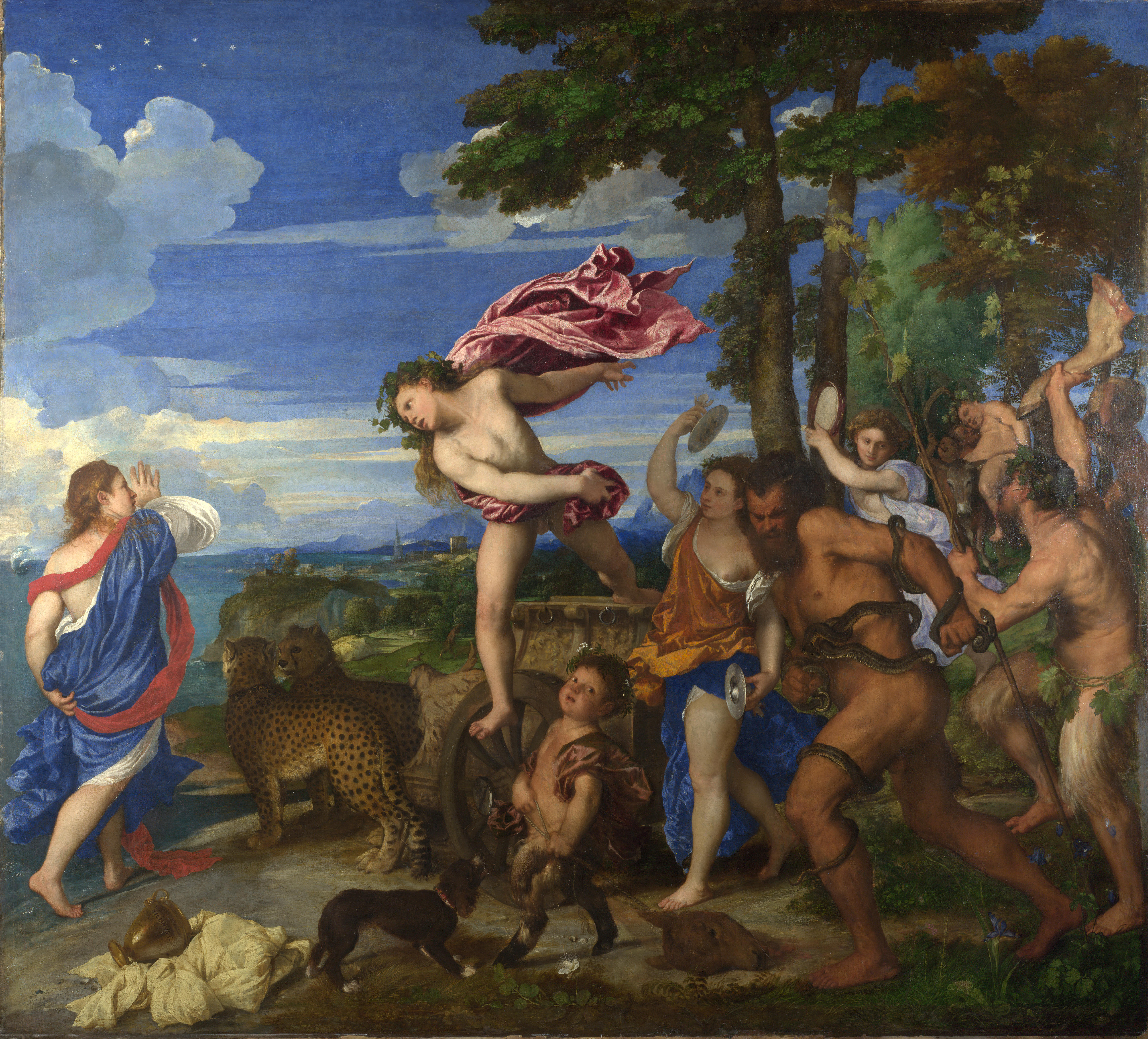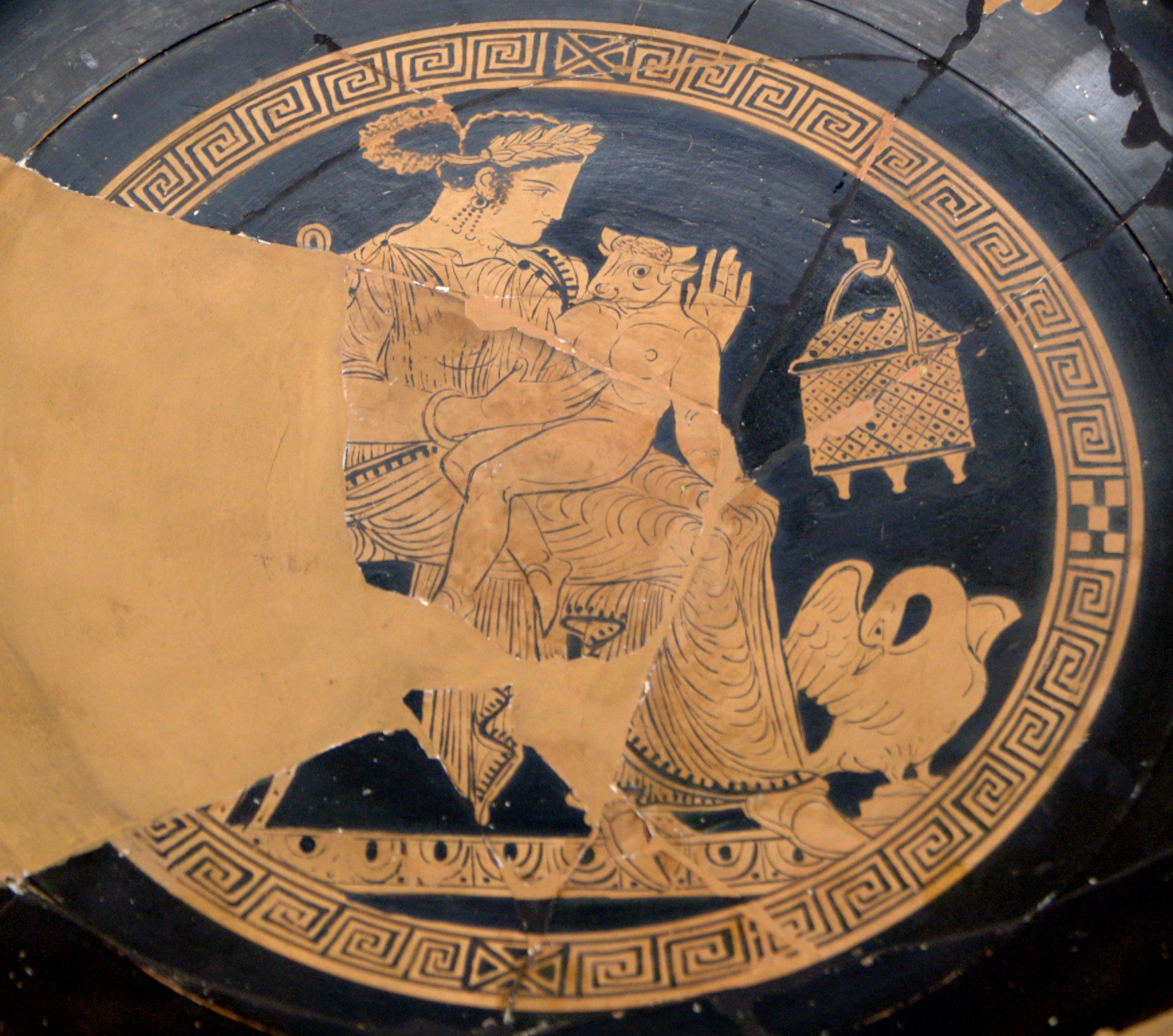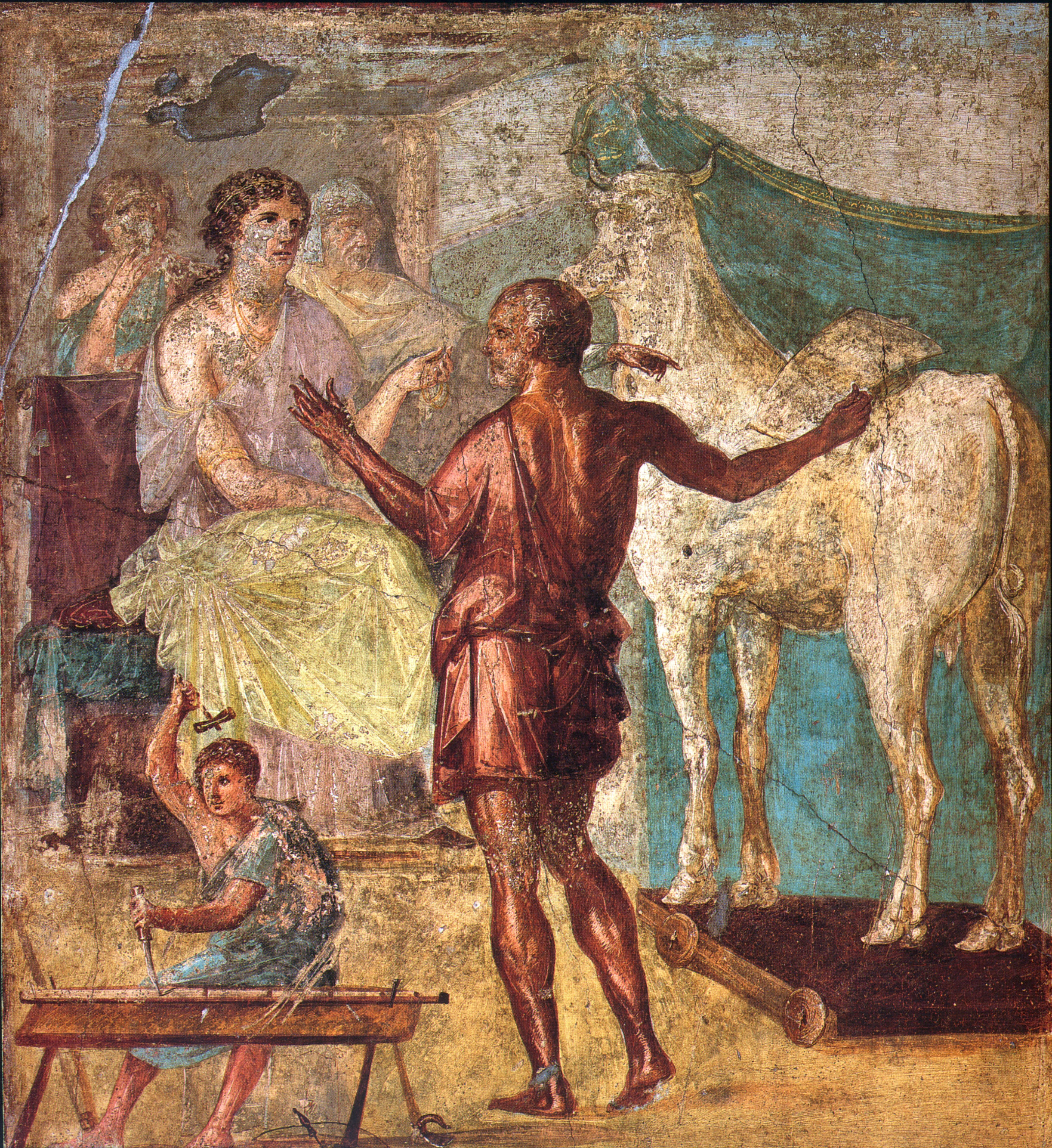|
Ariadne
In Greek mythology, Ariadne (; ; ) was a Cretan princess, the daughter of King Minos of Crete. There are variations of Ariadne's myth, but she is known for helping Theseus escape from the Minotaur and being abandoned by him on the island of Naxos. There, Dionysus saw Ariadne sleeping, fell in love with her, and later married her. Many versions of the myth recount Dionysus throwing Ariadne's jeweled crown into the sky to create a constellation, the Corona Borealis. Ariadne is associated with mazes and labyrinths because of her involvement in the myths of Theseus and the Minotaur. There are also festivals held in Cyprus and Naxos in Ariadne's honor. Etymology Greek lexicographers in the Hellenistic period claimed that ''Ariadne'' is derived from the ancient Cretan dialectical elements ''ari'' (ἀρι-) "most" (which is an intensive prefix) and ''adnós'' (ἀδνός) "holy". Conversely, Stylianos Alexiou has argued that despite the belief being that Ariadne's name is of ... [...More Info...] [...Related Items...] OR: [Wikipedia] [Google] [Baidu] |
Theseus
Theseus (, ; ) was a divine hero in Greek mythology, famous for slaying the Minotaur. The myths surrounding Theseus, his journeys, exploits, and friends, have provided material for storytelling throughout the ages. Theseus is sometimes described as the son of Aegeus, king of Athens, and sometimes as the son of the god Poseidon. He is raised by his mother, Aethra (mother of Theseus), Aethra, and upon discovering his connection to Aegeus, travels overland to Athens, having many adventures on the way. When he reaches Athens, he finds that Aegeus is married to Medea (formerly wife of Jason), who plots against him. The most famous legend about Theseus is his slaying of the Minotaur, half man and half bull. He then goes on to unite Attica under Athenian rule: the ''synoikismos'' ('dwelling together'). As the unifying king, he is credited with building a palace on the fortress of the Acropolis. Pausanias (geographer), Pausanias reports that after ''synoikismos'', Theseus establishe ... [...More Info...] [...Related Items...] OR: [Wikipedia] [Google] [Baidu] |
Dionysus
In ancient Greek religion and Greek mythology, myth, Dionysus (; ) is the god of wine-making, orchards and fruit, vegetation, fertility, festivity, insanity, ritual madness, religious ecstasy, and theatre. He was also known as Bacchus ( or ; ) by the Greeks (a name later adopted by the Ancient Rome, Romans) for a frenzy he is said to induce called ''baccheia''. His wine, music, and ecstatic dance were considered to free his followers from self-conscious fear and care, and subvert the oppressive restraints of the powerful. His ''thyrsus'', a fennel-stem sceptre, sometimes wound with ivy and dripping with honey, is both a beneficent wand and a weapon used to destroy those who oppose his Cult of Dionysus, cult and the freedoms he represents. Those who partake of his mysteries are believed to become possessed and empowered by the god himself. His origins are uncertain, and his cults took many forms; some are described by ancient sources as Thrace, Thracian, others as Greek. In O ... [...More Info...] [...Related Items...] OR: [Wikipedia] [Google] [Baidu] |
Minotaur
In Greek mythology, the Minotaur (, ''Mīnṓtauros''), also known as Asterion, is a mythical creature portrayed during classical antiquity with the head and tail of a bull and the body of a man or, as described by Roman poet Ovid, a being "part man and part bull". He dwelt at the center of the Labyrinth, which was an elaborate maze-like construction designed by the architect Daedalus and his son Icarus, upon command of King Minos of Crete. According to tradition, every nine years the people of Athens were compelled by King Minos to choose Sacrificial victims of the Minotaur, fourteen young noble citizens (seven men and seven women) to be offered as sacrificial victims to the Minotaur in retribution for the death of Minos's son Androgeus (son of Minos), Androgeos. The Minotaur was eventually slain by the Athenian hero Theseus, who managed to navigate the labyrinth with the help of a thread offered to him by the King's daughter, Ariadne. Etymology The word "Minotaur" derives from ... [...More Info...] [...Related Items...] OR: [Wikipedia] [Google] [Baidu] |
Hypnos
In Greek mythology, Hypnos (; Ancient Greek: , 'sleep'), also spelled Hypnus, is the personification of sleep. The Roman equivalent is Somnus. His name is the origin of the word hypnosis. Pausanias (geographer), Pausanias wrote that Hypnos was the dearest friend of the Muses. Etymology According to the Dutch linguist Robert S. P. Beekes, the god's name derives from the Proto-Indo-European language, Proto-Indo-European root ''*sup-no-'' 'sleep'. Description Hypnos is usually the fatherless son of Nyx ("The Night"), although sometimes Nyx's consort Erebus ("The Darkness") is named as his father. His twin brother is Thanatos ("Death"). Both siblings live in the Greek underworld, underworld (Hades). According to rumors, Hypnos lived in a big cave, which the river Lethe ("Forgetfulness") comes from and where night and day meet. They call this area the Land of dreams (mythology), Land of Dreams. His bed is made of ebony, and on the entrance of the cave grow several Poppy, poppies a ... [...More Info...] [...Related Items...] OR: [Wikipedia] [Google] [Baidu] |
Thoas (king Of Lemnos)
In Greek mythology, Thoas (Ancient Greek: Θόας, "fleet, swift") was a son of the god Dionysus and Ariadne, the daughter of the Cretan king Minos. He was the king of Lemnos when the Lemnian women decided to kill all the men on the island. He was the only man to survive the massacre, having been saved by his daughter Hypsipyle. He is sometimes identified with the Thoas who was the king of the Taurians when Iphigenia was taken to the land of the Taurians and became a priestess of Artemis there. Family Thoas was the son of Dionysus and Ariadne. According to the mythographer Apollodorus, after the god Dionysus fell in love with Ariadne he carried her to Lemnos where they produced four sons Thoas, Staphylus, Oenopion, and Peparethus. However, according to Plutarch, by some accounts Oenopion and Staphylus were instead the sons of Theseus and Ariadne. Thoas was the father of Hypsipyle, and according to the ''Iliad'', by her and Jason, the grandfather of Euneus. Other sources ... [...More Info...] [...Related Items...] OR: [Wikipedia] [Google] [Baidu] |
Pasiphaë
In Greek mythology, Pasiphaë (; , derived from πᾶσι (dative plural) "for all" and φάος/φῶς ''phaos/phos'' "light") was a queen of Crete. The daughter of Helios and the Oceanid nymph Perse (mythology), Perse, Pasiphaë is notable as the mother of the Minotaur. Her husband, Minos, failed to sacrifice the Cretan Bull to Poseidon as he had promised. Poseidon then cursed Pasiphaë to fall in love with the bull. Athens, Athenian inventor Daedalus built a hollow cow for her to hide in so she could mate with the bull, which resulted in her conceiving the Minotaur. Family Parentage Pasiphaë was the daughter of List of solar deities, god of the Sun, Helios,Antoninus Liberalis41/ref> and the Oceanid nymph Perse (mythology), Perse. She was thus the sister of Aeëtes, Circe and Perses of Colchis. In some accounts, Pasiphaë's mother was identified as the island-nymph Crete (mythology), Crete herself. Like her doublet Europa (consort of Zeus), Europa, the consort of Zeus, h ... [...More Info...] [...Related Items...] OR: [Wikipedia] [Google] [Baidu] |
Evanthes
In Greek mythology, Evanthes or Euanthes (Ancient Greek: Εὐανθής means "the richly blooming") may refer to two different individuals: * Evanthes, brother of Oenopion, Eustathius on Homer, ''Odyssey'' 1623.44 as cited in Hesiod, '' Ehoiai'' fr. 86 son of Ariadne and Dionysus. His mother was probably the nymph Helice and his only sister was Merope (Aero) who was raped by the giant Orion. Together with his brothers, Talus, Melas, Salagus and Athamas, they followed their father when he sailed from Crete to settle in Chios. Pausanias7.4.8/ref> Other sources makes Euanthes a son of Dionysus and Ariadne and brother to Oenopion, Thoas, Staphylus, Latromis and Tauropolis. He was also said to be one the generals of Rhadamanthys who was presented by the later with the city of Maroneia. Euanthes had a son Maron who was encountered by Odysseus in Ismarus, land of the Ciconians. * Evanthes, a Phrygian who fought on Aeneas' side in Italy. He was killed by Mezentius, king of the ... [...More Info...] [...Related Items...] OR: [Wikipedia] [Google] [Baidu] |
Phlias
Phlias (Ancient Greek: Φλίας) or Phlius or Phliasus was the son of Dionysus and Ariadne, and husband of Chthonophyle in Greek mythology. A native of Araithyrea in Argolis, he is mentioned as one of the Argonauts. Family Pausanias cites a version in which Phlias is given as son of Ceisus, but himself maintains that Phlias was the son of Dionysus by Araethyrea (daughter of Aras), whereas Chthonophyle was his wife and mother of his son Androdamas. Hyginus calls him Phliasus, and a son of Dionysus and Ariadne. In the ''Argonautica Orphica'', it is simply stated that his mother was a nymph, without mention of her name. The town of Phlius (formerly called Araithyrea) was believed to have derived its name from him.Stephanus of Byzantium, ''Ethnica'' s.v. ''Phlious''. Notes References * Apollonius Rhodius, ''Argonautica'' translated by Robert Cooper Seaton (1853-1915), R. C. Loeb Classical Library Volume 001. London, William Heinemann Ltd, 1912Online version at the Topos ... [...More Info...] [...Related Items...] OR: [Wikipedia] [Google] [Baidu] |
Phaedra (mythology)
In Greek mythology, Phaedra (; ) was a Crete, Cretan princess. Her name derives from the Greek word (), which means "bright." According to legend, she was the daughter of Minos and Pasiphaë, and the wife of Theseus. Later in life, Phaedra fell in love with her Stepchild, stepson, Hippolytus of Athens, Hippolytus. After he rejected her advances, she accused him of trying to rape her. In response, Theseus prayed to Poseidon and asked the god to kill Hippolytus, which he did. Phaedra then committed suicide. The story of Phaedra is told in Euripides' play ''Hippolytus (play), Hippolytus'', Seneca the Younger's ''Phaedra (Seneca), Phaedra'', and Ovid's ''Heroides''. It has inspired many modern works of art and literature, including Phèdre, a play by Jean Racine. Family Phaedra was a daughter of King Minos and Queen Pasiphaë of Crete, who had a total of eight children together. This included three daughters: Acacallis (mythology), Acacallis, Ariadne, and Xenodice (mythology), Xen ... [...More Info...] [...Related Items...] OR: [Wikipedia] [Google] [Baidu] |
Xenodice (mythology)
In Greek mythology, Xenodice or Xenodike (Ancient Greek: Ξενοδίκη) may refer to the following characters: * Xenodice, a Crete, Cretan princess as the daughter of King Minos either by Pasiphaë, Pasiphae or Crete (mythology), Crete. She was the sister of Acacallis (mythology), Acacallis, Ariadne, Androgeus (son of Minos), Androgeus, Deucalion (Cretan), Deucalion, Phaedra (mythology), Phaedra, Glaucus (son of Minos), Glaucus and Catreus. * Xenodice, a Troy, Trojan captive. (see List of children of Priam) * Xenodice, daughter of Syleus (mythology), Syleus, killed by Heracles along with her father.Tzetzes, ''Chiliades'' 2.432–425 Notes References * Bibliotheca (Pseudo-Apollodorus), Apollodorus, ''The Library'' with an English Translation by Sir James George Frazer, F.B.A., F.R.S. in 2 Volumes, Cambridge, MA, Harvard University Press; London, William Heinemann Ltd. 1921. ISBN 0-674-99135-4Online version at the Perseus Digital Library. [...More Info...] [...Related Items...] OR: [Wikipedia] [Google] [Baidu] |
Enyeus
In Greek mythology, the name Enyeus (Ancient Greek: Ἐνυεύς) may refer to: *Enyeus, a king of the island Skyros, which had been assigned to him by Rhadamanthys under whom he served as a general. According to scholia on the ''Iliad'', he was a son of Dionysus and Ariadne. In the ''Iliad'' itself, his kingdom is said to have been invaded by Achilles. *Enyeus, a warrior who fought and fell in the war of the Seven against Thebes. *Enyeus, a defender of Troy killed by Ajax the Great. *Enyeus, father of the Delphian prophetess Homoloia.Suida, s.v. ''homolōios'' Notes References * Diodorus Siculus, ''The Library of History'' translated by Charles Henry Oldfather. Twelve volumes. Loeb Classical Library. Cambridge, Massachusetts: Harvard University Press; London: William Heinemann, Ltd. 1989. Vol. 3. Books 4.59–8Online version at Bill Thayer's Web Site* Diodorus Siculus, ''Bibliotheca Historica. Vol 1-2''. Immanel Bekker. Ludwig Dindorf. Friedrich Vogel. in aedibus B. G. Teubne ... [...More Info...] [...Related Items...] OR: [Wikipedia] [Google] [Baidu] |
Maron (mythology)
In Greek mythology, Maron () or Maro (; Ancient Greek: Μάρων, ''gen.'' Μάρωνος) was the hero of sweet wine. He was an experienced man in the cultivation of the vine. Family Maron was the son of Evanthes, EuanthesEustathius of Thessalonica, Eustathius on Homer, ''Odyssey'' 1623.44 as cited in Hesiod, ''Catalogue of Women, Ehoiai'' fr. 86; Philostratus of Lemnos, Philostratus the Athenian, ''Heroicus'' 680 (some also call him a son of Oenopion, Silenus, and a pupil of Silenus), and grandson of Dionysus and Ariadne. As the grandson of Dionysus, Bacchus and the Crete, Cretan princess, Maron was nephew to Thoas (king of Lemnos), Thoas, Staphylus (son of Dionysus), Staphylos and Eunous. Mythology Maron was mentioned among the companions of Dionysus. The city Maroneia in Thrace was named after its founder Maron; there he was venerated in a sanctuary. The god Osiris (Dionysus) left Maron, who was now old, in that land to supervise the culture of the plants which he introduc ... [...More Info...] [...Related Items...] OR: [Wikipedia] [Google] [Baidu] |





